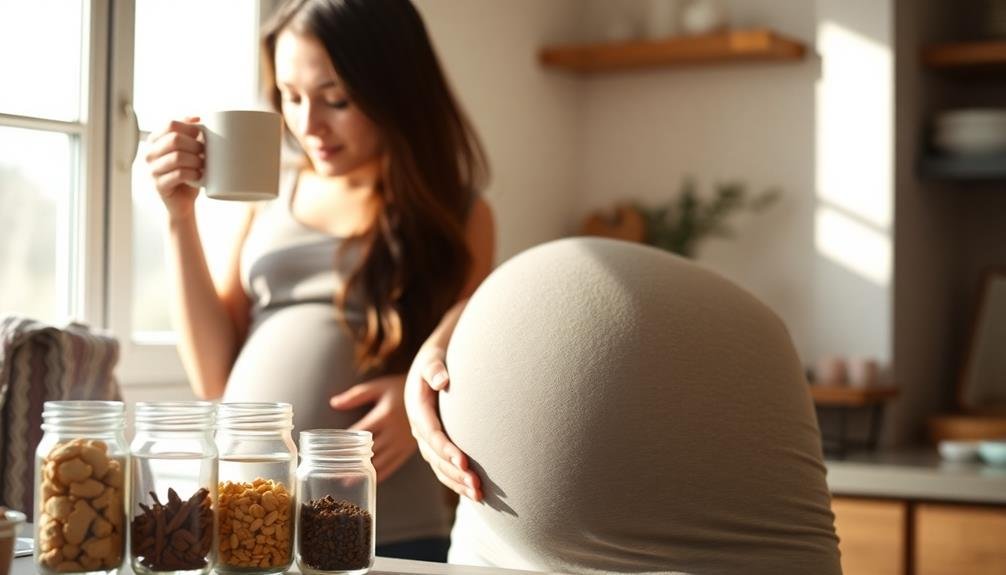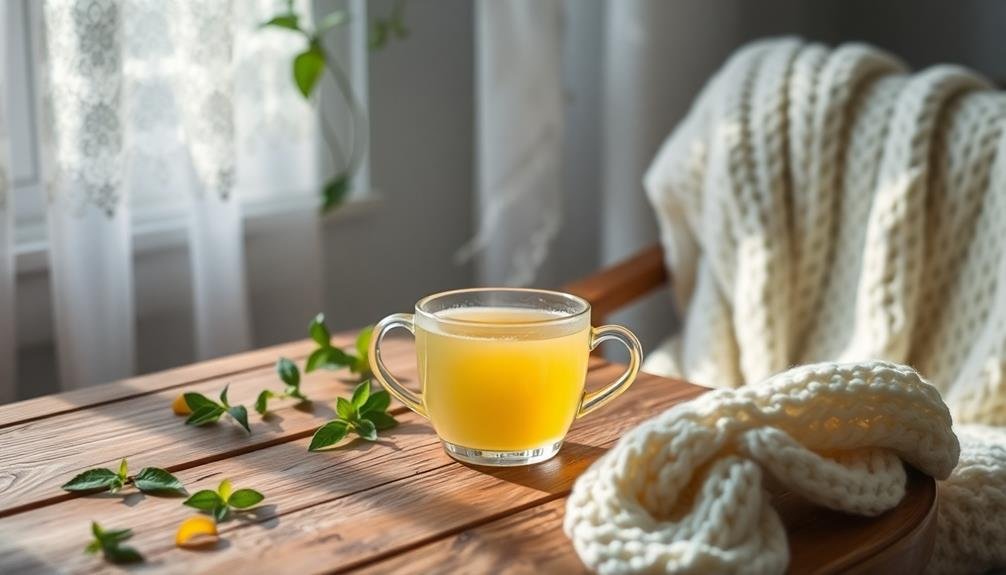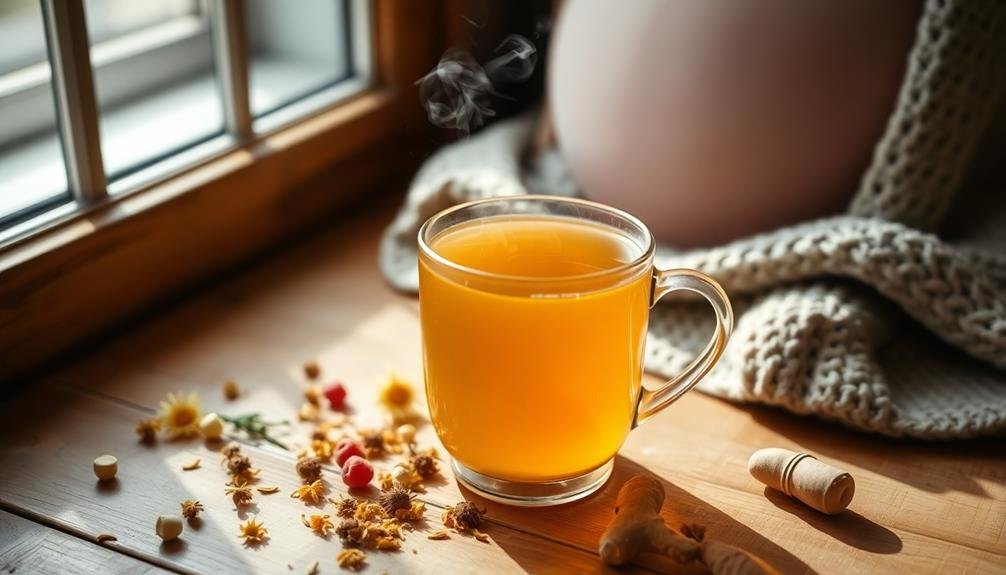Pregnancy-safe herbal teas offer numerous benefits without the controversy of peppermint. You'll find comfort in blends like chamomile and ginger, which ease nausea and promote relaxation. Red raspberry leaf tea acts as a uterine tonic, preparing your body for labor. Lemon balm can help manage stress and improve sleep quality. These caffeine-free options provide essential nutrients and hydration throughout your pregnancy. When creating your own blends, stick to herbs like ginger, chamomile, raspberry leaf, lemon balm, and nettle. Always consult your healthcare provider before introducing new herbal teas into your routine. Discover the perfect blend to support your pregnancy journey and boost your well-being.
Benefits of Herbal Teas During Pregnancy

Sipping on herbal teas during pregnancy can offer a range of benefits for expectant mothers. These natural brews can help alleviate common pregnancy discomforts while providing essential nutrients.
You'll find that certain herbal teas can reduce nausea and morning sickness, a welcome relief during your first trimester.
As your pregnancy progresses, you might experience digestive issues. Many herbal teas can soothe an upset stomach and ease constipation, promoting better digestive health.
They're also excellent for hydration, which is vital during pregnancy. Some herbal blends can even help you relax and reduce stress, contributing to better sleep quality.
Certain herbs are rich in vitamins and minerals that support fetal development. For instance, nettle tea is high in iron, calcium, and magnesium.
Red raspberry leaf tea is known for its potential to strengthen the uterus and prepare it for labor.
However, it's important to remember that not all herbs are safe during pregnancy. Always consult with your healthcare provider before incorporating new teas into your diet.
They can guide you on which herbs are beneficial and which to avoid, ensuring a safe and comfortable pregnancy experience.
Pregnancy-Safe Herbs for Tea Blends
When crafting your own pregnancy-safe tea blends, it's important to know which herbs are generally considered safe for expectant mothers. Always consult your healthcare provider before consuming any herbal teas during pregnancy, as individual needs may vary.
Here's a table of pregnancy-safe herbs commonly used in tea blends:
| Herb | Flavor Profile | Potential Benefits |
|---|---|---|
| Ginger | Spicy, warming | Nausea relief, digestion aid |
| Lemon Balm | Citrusy, mild | Relaxation, stress relief |
| Red Raspberry Leaf | Earthy, slightly tart | Uterine tonic, iron source |
| Chamomile | Floral, sweet | Relaxation, sleep aid |
| Nettle | Grassy, earthy | Iron source, nutrient-rich |
When creating your blends, start with small amounts of each herb and adjust to taste. You can combine two or more herbs for a more complex flavor profile. For example, try mixing ginger and lemon balm for a soothing, nausea-fighting blend. Or, combine red raspberry leaf and nettle for a nutrient-packed infusion. Remember to steep your herbs properly, typically for 5-10 minutes, to extract their beneficial properties without making the tea too strong.
Chamomile and Ginger Comfort Blend

One of the most popular pregnancy-safe tea blends combines the soothing properties of chamomile with the stomach-settling effects of ginger. This comforting duo can help alleviate common pregnancy discomforts like nausea, anxiety, and sleep issues.
To create this blend, you'll need dried chamomile flowers and ginger root. Use 1 part ginger to 2 parts chamomile. Start with 1 teaspoon of the mixture per cup of hot water, and steep for 5-7 minutes. You can adjust the ratio to suit your taste preferences.
Chamomile is known for its calming effects and may help reduce stress and promote better sleep. It's also believed to have mild anti-inflammatory properties.
Ginger, on the other hand, is renowned for its ability to ease nausea and aid digestion.
While this blend is generally considered safe during pregnancy, it's always best to consult your healthcare provider before introducing new herbal teas into your routine. They may advise you on appropriate consumption levels and any potential interactions with medications or supplements you're taking.
Remember to enjoy this blend in moderation, as part of a balanced pregnancy diet.
Raspberry Leaf Nourishing Infusion
Raspberry leaf tea has gained popularity among expectant mothers for its potential benefits during pregnancy. This nourishing infusion is believed to strengthen the uterus and prepare it for labor.
You'll find that raspberry leaf tea has a mild, slightly sweet flavor that's reminiscent of black tea but without the caffeine.
To prepare your raspberry leaf infusion, steep 1-2 teaspoons of dried raspberry leaves in hot water for 10-15 minutes. It's best to start with small amounts in the second trimester and gradually increase your intake as you approach your due date. Always consult your healthcare provider before adding any new herbal teas to your pregnancy routine.
Here are some potential benefits of raspberry leaf tea during pregnancy:
- May help tone the uterus and prepare it for labor
- Rich in vitamins and minerals, including iron, calcium, and magnesium
- May help reduce morning sickness and nausea
Remember that while raspberry leaf tea is generally considered safe, it's essential to use high-quality, organic herbs and to follow recommended dosages.
If you experience any unusual symptoms or discomfort, discontinue use and consult your healthcare provider immediately.
Lemon Balm Relaxation Tea

While raspberry leaf tea offers potential benefits for uterine health, lemon balm tea provides a different set of advantages for expectant mothers. This gentle herb is known for its calming properties, making it an excellent choice for managing stress and anxiety during pregnancy.
You'll find that lemon balm can help ease tension and promote relaxation without causing drowsiness.
To prepare lemon balm tea, steep 1-2 teaspoons of dried lemon balm leaves in hot water for 5-10 minutes. It's best to drink this tea in the evening, as it can help improve sleep quality. The mild lemony flavor is invigorating and soothing, making it a pleasant addition to your nightly routine.
Lemon balm tea may also aid in digestion and reduce heartburn, common discomforts during pregnancy. Additionally, it's been shown to have mood-boosting effects, which can be particularly beneficial if you're experiencing prenatal mood swings or mild depression.
However, as with any herbal remedy during pregnancy, it's essential to consult your healthcare provider before incorporating lemon balm tea into your diet. They can advise on the appropriate dosage and frequency based on your individual needs and health status.
Frequently Asked Questions
Can I Drink Herbal Teas Throughout All Trimesters of Pregnancy?
You can drink certain herbal teas throughout pregnancy, but it's essential to be cautious. Some herbs can be harmful to your baby. Always consult your healthcare provider before consuming any herbal teas during pregnancy.
How Many Cups of Herbal Tea Are Safe to Consume Daily?
You should limit your herbal tea intake to 1-2 cups daily during pregnancy. It's best to consult your healthcare provider, as they'll consider your specific health needs and the tea's ingredients when advising you.
Are There Any Potential Side Effects of Drinking Pregnancy-Safe Herbal Teas?
While pregnancy-safe herbal teas are generally beneficial, you might experience mild side effects like nausea or heartburn. You'll want to watch for allergic reactions and consult your doctor if you're taking medications or have health concerns.
Can I Mix Different Herbs to Create My Own Pregnancy Tea Blends?
You can mix herbs to create your own pregnancy tea blends, but be cautious. Always consult your healthcare provider first. Stick to well-known, safe herbs and avoid those with potential risks. Start with small amounts to test for reactions.
Should I Consult My Healthcare Provider Before Drinking Herbal Teas During Pregnancy?
Yes, you should always consult your healthcare provider before drinking herbal teas during pregnancy. They'll assess your individual health needs and provide personalized advice on which teas are safe for you and your baby.
In Summary
You've now got a variety of safe, peppermint-free herbal tea blends to enjoy during your pregnancy. Remember to always consult your healthcare provider before trying new herbs. Experiment with these recipes to find your favorite combinations. Don't hesitate to adjust the ratios to suit your taste. By incorporating these nourishing and comforting teas into your daily routine, you'll support your well-being and that of your growing baby. Enjoy your pregnancy journey with these soothing brews!





Leave a Reply